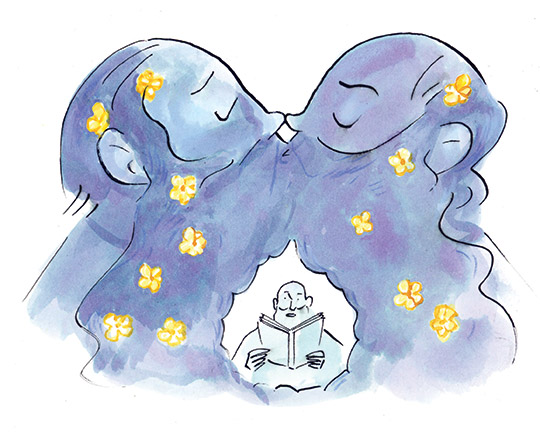Who Will Marry Us?
How to find a rabbi, a priest, an imam, or a former boss to say your ceremony.
 |
Illustration by Graham Roumieu
|
Get in Touch: About a year before the wedding.
The First Meeting: Don’t be surprised to find yourself in the rabbi’s home, and also feel free to invite one to yours. �I invite prospective couples over,� says Renee Feller, a New York Reform rabbi. �When you walk into someone’s house, you can tell what kind of person they are.� After the intros, you’ll start to figure out what you want included in the ceremony�say, if you want poems read or for your families to have certain roles.
Typical Spiel: Almost anything goes, depending on your rabbi’s personality. He or she could quote Scripture and talk about your personal love story (or both) and, as rabbis are wont to do, crack jokes. �I like to use humor,� says Feller. �A recent joke I made was, �If there is anyone present who has just cause why this couple should not continue to be united � you probably should not have come today.’ I got the couple’s approval first.�
Cost: From $750.
Get in Touch: Start a year or more in advance if you’re joining a church. �And spend some time on the church website to learn what we believe,� says Collins. If you don’t want to be married in a church�or join one�but do want a priest or pastor to marry you, you can usually find one not tied to a parish to do the job. Try to do this three to six months out. For Roman Catholics, try websites such as citiministries.org or cacina.org; for other denominations, try weddingpastorsusa.org.
The First Meeting: Expect some couples counseling, including a primer on the challenges that come with marriage, says the Reverend James J. Balija, a Catholic priest based in Fair Lawn, New Jersey. �We talk about being present for each other and the value of communication,� he says. Collins says he requires premarital counseling but adds, �I’ve never had anyone say it’s a waste of time. We want the marriage, and not just the wedding, to be successful.�
Typical Spiel: Generally, this is stock material for whatever denomination you’re being married in, such as a passage from the Song of Solomon, or heavy preaching about how to make the marriage work. �It’s often the same homily I give at every wedding,� Balija admits, �although I do add some things that are specific to the couple. You’re not going to tell a couple that’s on their second marriage the same thing you tell 20-somethings.� Still, Collins adds, �it’s not just a wedding for the couple; it’s a service of the church. It’s an expression of what we believe in and value.�
Cost: Most churches ask for a donation; a nonaffiliated priest or pastor like Balija charges about $650.
Get in Touch: A month and a half before the wedding.
The First Meeting: There’s usually a breakdown�and a word of caution�about what the marriage contract means in Islam. �The couple has to mutually agree to everything that goes into the contract,� says Khalid Latif, an imam and the director of NYU’s Islamic Center. �You can say, �Here are certain things we agree to, like our kids will be homeschooled.’ If a condition isn’t met in the contract, it can serve as grounds for divorce.� You’ll also discuss what you want the ceremony to look like, including how to keep it celebratory and uplifting. �I’ve heard some horror stories, like imams who talked about the Iraq War,� Latif says.
Typical Spiel: A five-to-ten-minute general marriage sermon, which includes certain verses from the Koran and the ideas of love and marriage in Islam. Qay-yoom usually talks about the five principles of marriage in Islam: �Patience, compromise, sacrifice, cooperation, and communication.�
Cost: From $300.
Get in Touch: Four to six months before the wedding.
The First Meeting: You should feel comfortable asking the celebrant anything, says Turchin. �I like when couples basically interview me,� she says. �Then I’ll ask probing questions to get to know the couple.� Expect touchy-feely-type questions based on your first impressions of each other, if there’s anything unique about your wedding bands, what the proposal was like, how important your ethnic origins are to you, and what your hopes and aspirations are for the marriage. You’ll leave with homework, like ideas for readings.
Typical Spiel: Sarah Ritchie, a New York wedding celebrant, often explains how the couple met, quoting from the story the couple told her. �I believe this retelling sets the stage and reflects the couple’s emotional closeness. And when I’m using their words, that takes the focus off me and keeps it on them.�
Cost: From $650.
Get in Touch: It takes about a month to get registered as a legal officiant, but ask your friend sooner�at about the same time you enlist the wedding party.
The First Meeting: This may sound obvious, but �be certain your fiancé is onboard,� says Crystal L. Bailey, director of the Etiquette Institute based in D.C. �There’s nothing worse than for the person bringing you together to cause friction.� Bailey warns against picking the �resident prankster� to do the deed. Also, she says, �don’t get so wrapped up in landing the �impossible to book’ or famous officiant, which can easily overwhelm your planning and overshadow your big day. Ultimately, you want someone who knows you and your fiancé; a close friend is your best choice.�
Typical Spiel: The only must (to make the ceremony legal) is for the couple to state �I do� in the presence of an officiant and a witness. The rest is up to you and your newly ordained friend. For help, online guides abound�some even include full scripts. When in doubt, make it brief: Keep it to the �I dos,� the ring exchange, and the kiss.
Cost: About $25 for the online ministry, and $15 to register with the city clerk.
 |
Illustration by Graham Roumieu
|